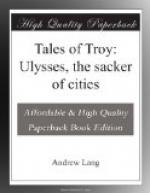Ulysses was now the only Greek chief that still fought in the centre. The Greeks all fled, and he was alone in the crowd of Trojans, who rushed on him as hounds and hunters press round a wild boar that stands at bay in a wood. “They are cowards that flee from the fight,” said Ulysses to himself; “but I will stand here, one man against a multitude.” He covered the front of his body with his great shield, that hung by a belt round his neck, and he smote four Trojans and wounded a fifth. But the brother of the wounded man drove a spear through the shield and breastplate of Ulysses, and tore clean through his side. Then Ulysses turned on this Trojan, and he fled, and Ulysses sent a spear through his shoulder and out at his breast, and he died. Ulysses dragged from his own side the spear that had wounded him, and called thrice with a great voice to the other Greeks, and Menelaus and Aias rushed to rescue him, for many Trojans were round him, like jackals round a wounded stag that a man has struck with an arrow. But Aias ran and covered the wounded Ulysses with his huge shield till he could climb into the chariot of Menelaus, who drove him back to the ships.
Meanwhile, Hector was slaying the Greeks on the left of their battle, and Paris struck the Greek surgeon, Machaon, with an arrow; and Idomeneus bade Nestor put Machaon in his chariot and drive him to Nestor’s hut, where his wound might be tended. Meanwhile, Hector sped to the centre of the line, where Aias was slaying the Trojans; but Eurypylus, a Greek chief, was wounded by an arrow from the bow of Paris, and his friends guarded him with their shields and spears.
Thus the best of the Greeks were wounded and out of the battle, save Aias, and the spearmen were in flight. Meanwhile Achilles was standing by the stern of his ship watching the defeat of the Greeks, but when he saw Machaon being carried past, sorely wounded, in the chariot of Nestor, he bade his friend Patroclus, whom he loved better than all the rest, to go and ask how Machaon did. He was sitting drinking wine with Nestor when Patroclus came, and Nestor told Patroclus how many of the chiefs were wounded, and though Patroclus was in a hurry Nestor began a very long story about his own great deeds of war, done when he was a young man. At last he bade Patroclus tell Achilles that, if he would not fight himself, he should at least send out his men under Patroclus, who should wear the splendid armour of Achilles. Then the Trojans would think that Achilles himself had returned to the battle, and they would be afraid, for none of them dared to meet Achilles hand to hand.




